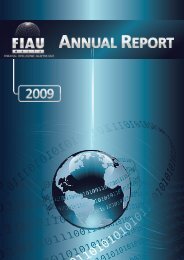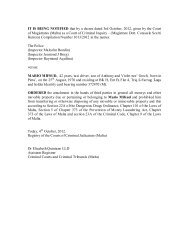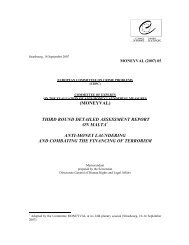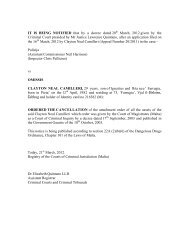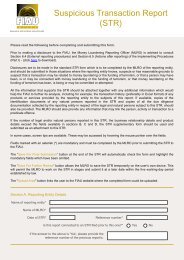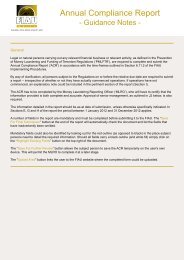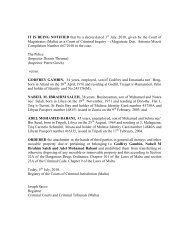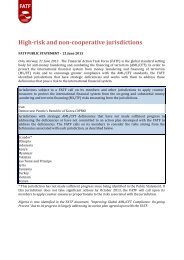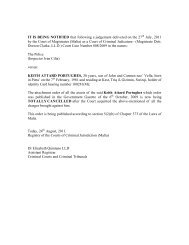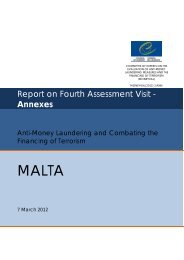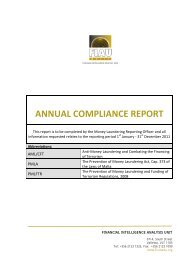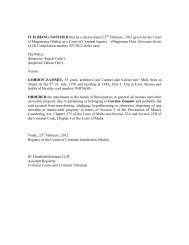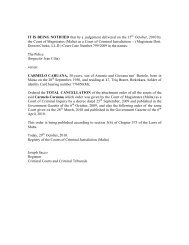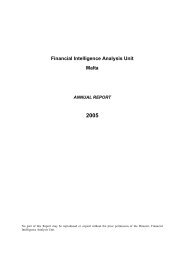Notarial Acts ?inter vivos? - Financial Intelligence Analysis Unit
Notarial Acts ?inter vivos? - Financial Intelligence Analysis Unit
Notarial Acts ?inter vivos? - Financial Intelligence Analysis Unit
You also want an ePaper? Increase the reach of your titles
YUMPU automatically turns print PDFs into web optimized ePapers that Google loves.
<strong>Notarial</strong> <strong>Acts</strong> “<strong>inter</strong> <strong>vivos</strong>” and customer due diligence.<br />
Forward<br />
1. In the definition of “relevant activity” 1 Notaries are the<br />
prime protagonists. Their mere participation or their assistance<br />
in the planning and execution of financial or real estate<br />
transactions for their clients without the implementation of the<br />
“measures and procedures” 2 of the regulations may result in<br />
hefty fines or imprisonment, or both 3 .<br />
1.1 The Work of a Notary has grown at an exponential rate. But<br />
so have the aides provided by sophisticated software. This<br />
notwithstanding, what is to be discussed in this short paper is<br />
the human input which no computer can substitute. Throughout<br />
The Money Laundering Act and its Regulations the buzz words<br />
are “suspicious” and “risk assessment” These are subjective<br />
criteria and impose on us as subject persons the need for<br />
constant vigilance. Non-vigilance may result in nonimplementation<br />
of the measures and procedures of Article 4 of<br />
the Regulations. This state of affairs may, even in the absence<br />
of an underlying “criminal activity”, expose the Notary to the<br />
convictions and punishments as those of Article 4 (5).<br />
1.2 In this paper I shall highlight the risks, hazards and<br />
dilemmas which a Notary experiences in all the stages of deeds<br />
“<strong>inter</strong> <strong>vivos</strong>” namely in the set-up, preparation and eventual<br />
publication of deeds which make up the bulk of a Notary’s<br />
professional work and which makes a Notary a subject person<br />
in terms of the definition 4 . Such are Deeds of Sale preceded or<br />
not preceded by konvenji, Deeds of Loan or Acknowledgement<br />
of Debts, Deeds of Datio in Solutum, Deeds of Partition, and<br />
Trust Deeds. Besides risks arising from the publishing of public<br />
deeds there are those arising from services as for example<br />
when a Notary acts as a depositary Notary of private trusts.<br />
1.3 In maintaining the due diligence requirements of the cases 1<br />
to 4 5 of Regulation 2 in the definition of a business relationship,<br />
a Notary tests their application to all new applicants for<br />
business when contact is first made between him and the<br />
applicants, particularly where it concerns the “clean”<br />
provenance of the items to be sold, transferred or partitioned,<br />
and the clean provenance of their consideration.<br />
1 S.L. 373.01<br />
2 Regulation 4 of S.L.373.01<br />
3 Regulation 4 (5) of S.L.373.01<br />
4 Regulation 2 in the definition of “relevant Activity”<br />
5 Regulation 2 in the definition of “business relationship”
The law imposes on a subject person due diligence measures<br />
which have to be executed to a high degree of vigilance and<br />
detail.<br />
1.4 However an analysis of the wording of the Regulations<br />
demands on a Notary the ability to perform a sort of delicate<br />
balancing act. On the one hand he is expected to be thorough<br />
and leave nothing to chance in the prevention of Money<br />
Laundering. On the other hand “customer acceptance policies”<br />
are not to be restrictive.<br />
An example of this are:<br />
a) Regulation 7(9) where the Notary “must develop and<br />
establish “effective customer acceptance policies and<br />
procedures” that are not restrictive in allowing the provision of<br />
financial and other services to the Public in general” 6 , and<br />
b) Regulation 7(8) where the Notary must “determine the<br />
extent of the application of Customer due diligence on a risk<br />
sensitive basis depending on the type of Customer, business<br />
relationship, product or transaction”.<br />
<strong>Notarial</strong> <strong>Acts</strong><br />
2. <strong>Notarial</strong> <strong>Acts</strong> are classified into acts “<strong>inter</strong> <strong>vivos</strong>” or acts<br />
“causa mortis”. I shall concentrate on the former but I do not<br />
exclude that the latter may pose problems that may instil in the<br />
Notary publishing the Will suspicion of criminal activity in the<br />
case of movables (say bequests of jewellery by the testator<br />
which the Notary suspects to be the fruit of theft) or in the<br />
cases of immovable property acquired by a testator through<br />
money laundering.<br />
<strong>Acts</strong> “<strong>inter</strong> <strong>vivos</strong>”.<br />
3 <strong>Acts</strong> “<strong>inter</strong> <strong>vivos</strong>” are those contracts entered into between<br />
legal or natural persons in accordance with the formal<br />
requirements prescribed by the respective applicable laws 7 and<br />
which, on their publication confer probatory evidence in a<br />
Court of Law and which are referred to in Civil Law<br />
Jurisdictions as “authentic instruments” recognised as such by<br />
the European Court of Justice 8 . Such are deeds drawn up and<br />
executed by Notaries when<br />
6 Regulation 7(9)<br />
7 Civil Law, Company law, the application of diverse Fiscal laws to a<br />
particular transaction and The <strong>Notarial</strong> Profession and <strong>Notarial</strong> Archives<br />
Act (Chapter 55) of the Laws of Malta<br />
8 Unibank vrs Christensen (17.06.1999 C-260/97)
a) “they participate, whether by acting on behalf of and<br />
for their client in any financial or real estate transaction,<br />
or<br />
b) by assisting in the planning or execution of transactions<br />
for their clients concerning (i) the buying and selling of<br />
real property or business entities, (ii) managing of client<br />
money, securities or other assets, ………… (v) when<br />
they concern the creation, operation or management of<br />
trusts, Companies or similar structures, or when acting<br />
as a trust or Company Service Provider ” 9 as in the case<br />
of a depositary Notary of Private Trusts.<br />
Additional activities<br />
4. Sub-regulation (i) of the definition of “relevant activity” and<br />
sub-regulation (j) of the definition of “relevant financial<br />
business” of Regulation 2 would qualify Notaries as subject<br />
persons of additional activities which they may opt to provide<br />
other than the traditional or principal relevant activities<br />
mentioned in the preceding paragraph.<br />
Salient <strong>Notarial</strong> deeds “<strong>inter</strong> <strong>vivos</strong>”.<br />
5. For economy of time and in view of the state of mind and<br />
disposition of this audience after several hours of Money<br />
Laundering gibberish, I shall be brief and analyse the salient<br />
<strong>Notarial</strong> deeds traditionally published by a Notary in the light<br />
of the requirements of the law and its Regulations, with<br />
particular reference to Regulation 7 10 (Customer due diligence),<br />
8 11 (Verification of identity), 12 12 (Reliance on performance by<br />
third parties), particularly sub-regulations (8) and (9) of this<br />
regulation, 13 13 (Record Keeping Procedures), and 15 14<br />
(Reporting Procedures and Obligations).<br />
The Pre-contract stage.<br />
The Preliminary Agreement.<br />
6. With the coming into force of the Act and Regulations and<br />
the registration of preliminary agreements for fiscal<br />
requirements the preliminary has assumed a special place in<br />
contractual relations.<br />
9 Regulation 2. Definition of “relevant activity”<br />
10 Customer due diligence<br />
11 Verification of identification<br />
12 Reliance on performance by third parties<br />
13 Record Keeping procedures<br />
14 Reporting Procedures and obligations
6.1 This applies to so called “konvenji” leading to contracts of<br />
sale of movable or immovable property and also to all<br />
documents that are in the nature of preparatory documents to be<br />
followed by a binding contract, as are Memoranda of<br />
Understanding. These are intrinsically entered into for a period<br />
of time within which due-diligence measures and requirements<br />
are executed by the Notary or, in the case of an MOU, by either<br />
of the parties.<br />
No preliminary agreement<br />
7. It is my opinion that the protagonists of the business<br />
relationship cannot do without the preliminary agreement.<br />
7.1 Applicants for business who do away with a preliminary<br />
because of the reciprocal trust which they claim exists between<br />
them should normally trigger “Case 2 (suspicion)” business<br />
relationships 15 unless such applicants were already habitual<br />
clients of the Notary and the nature of their business was<br />
known to him. It is a fact that new applicants for business who<br />
do away with the preliminary would under normal<br />
circumstances induce a Notary to consider making a suspicious<br />
transaction report to the <strong>Financial</strong> <strong>Intelligence</strong> <strong>Analysis</strong> <strong>Unit</strong> in<br />
accordance with sub-regulation 6 of Regulation 15. The<br />
dilemma of the Notary in such case of a transaction which<br />
would qualify as “high risk” as whether he should nip the<br />
relationship in the bud (viz refuse to proceed outright) or<br />
whether time should be gained so as not to frustrate any<br />
investigation being carried out by the appropriate authorities as<br />
the proviso to Regulation 8 sub-regulation 5 seems to imply.<br />
The proviso states: “where to refrain in such a manner is<br />
impossible or is likely to frustrate efforts of investigating a<br />
suspected money laundering or funding of terrorism operation,<br />
that business shall proceed on condition that a disclosure is<br />
immediately lodged with FIAU in accordance with Regulation<br />
15 sub-regulation 6. Choosing to proceed in this case of no<br />
preliminary would mean the publication by the Notary of the<br />
deed itself and the need to report to FIAU within five days from<br />
such publication.<br />
7.2 I consider this as expecting too much from a subject person.<br />
The Notary in case of no konvenjo should have a choice of<br />
terminating the business relationship or proceeding with the<br />
contract. As the regulation states “shall proceed” the proviso<br />
excludes the possibility of the Notary terminating the business<br />
relationship.<br />
15 Regulation 2 of the Regulations
Where a preliminary is signed.<br />
8. Conversely where a preliminary is requested by one party<br />
(who in contracts of sale is normally an acquirer) particularly,<br />
if the final deed is subject to Bank finance, the Notary should<br />
logically consider the transaction as “low risk” for three<br />
reasons:<br />
a) the unlikely existence of any criminal activity<br />
particularly with the insertion of “subject to Bank loan”<br />
or “subject to building permits” clauses the insertion of<br />
which would logically exclude the existence of<br />
connivance between the parties for money laundering<br />
purposes.<br />
b) the fact that the applicant for business (the acquirer)<br />
would be under the scrutiny and vigilance of another<br />
subject person, namely the financial provider and<br />
c) the Notary would have more time (the period of the<br />
preliminary) to undergo the Customer due diligence<br />
procedures.<br />
Where therefore the parties sign a preliminary, reporting<br />
procedures are the exception not the rule and the process<br />
leading to completion and final deed can proceed.<br />
Identification of the applicants and verification<br />
9. Identification of the parties at this very early stage of the<br />
business relationship is a must.<br />
9.1 This is not a novel requirement for Notaries. Article 26 of<br />
the <strong>Notarial</strong> Profession and <strong>Notarial</strong> Archives Act 16 states:<br />
“The notary must personally be certain of the identity of the<br />
parties, or where such parties do not appear personally, of the<br />
identity of their agent. Such identity shall be ascertained by the<br />
production of the official identity card, passport or other similar<br />
official document, or where such document cannot be<br />
produced, on the testimony of two attestors personally known<br />
to the notary…..” .<br />
9.2 However the requirements of the Notary as a subject person<br />
under the regulations necessitate a much stricter identification<br />
process. For the purposes of Regulation 7 sub-regulation 3<br />
“Where an applicant for business is or appears to be acting<br />
otherwise than as principal, in addition to the identification and<br />
the verification of the identity of the applicant for business:<br />
16 Chapter 55 of the Laws of Malta
(a) subject persons shall ensure that the applicant for business<br />
is duly authorized in writing by the principal;<br />
(b) subject persons shall establish and verify the identity of the<br />
person on whose behalf the applicant for business is acting;<br />
(c) where the principal is a body corporate, a body of persons,<br />
or any other form of legal entity or arrangement, subject<br />
persons shall, in addition to verifying the legal status of the<br />
principal, identify all directors and, where such principal does<br />
not have directors, all such other persons vested with its<br />
administration and representation, and shall establish the<br />
ownership and control structure of the body of persons;<br />
(d) in addition to the requirements under paragraph (c), where<br />
the principal is a body corporate, a body of persons, trust or any<br />
other form of legal entity or arrangement in which there is a<br />
shareholding, or any other form of ownership <strong>inter</strong>est or assets<br />
held under a trustee or any other fiduciary arrangement, a<br />
subject person shall not undertake any business with or<br />
provide any service to the applicant for business unless that<br />
applicant for business discloses the identity of the beneficial<br />
owners, his principal, and the trust settlor, as the case may<br />
be, and produces the relevant authenticated identification<br />
documentation, and such disclosure procedures shall also apply<br />
where there are changes in beneficial ownership, or principal;<br />
9.3 At this juncture a question comes to mind. Is it logical to<br />
expect the Notary to be provided with all such requirements<br />
before the signing of the preliminary? It may not seem so. In<br />
fact if due diligence requirements have to be applied on a “risk<br />
sensitive basis”, in terms of sub-regulation 8 of Regulation 7,<br />
particularly in view of the fact that this is as yet the promise of<br />
sale stage, not the actual sale, is it not sufficient for the Notary<br />
to verify the identity of the attorney (or the representative in the<br />
case of a body of persons) and to leave the verification of the<br />
identity of the mandatory, directors, beneficial owners and trust<br />
settlor for the stage of the publication of the deed of sale itself,<br />
at which stage the transaction is deemed to be complete, and<br />
the property and consideration exchange hands?<br />
9.4 In my opinion this line of thought holds good also in cases<br />
where a deposit is paid on account of the purchase price of the<br />
sale, whether this is retained by the Notary, or is paid directly<br />
to a sellor. Payment of deposit should not at the stage of the<br />
signing of the preliminary give rise to the full requirements of<br />
the regulations unless there exists suspicion with regard to the<br />
provenance of the consideration, in which case, the Notary is to<br />
play safe and report to FIAU not later than five days.<br />
9.5 Adopting a different reasoning would contradict the<br />
generally accepted notion that preliminary agreements in the<br />
business of real estate are indicators of a healthy economy and,
saving “Case 2 (suspicion)” transactions which exclude<br />
simplified customer due diligence measures in terms of<br />
Regulation 10, this should carry enough ground with the FIAU<br />
or the <strong>Notarial</strong> Council (“any other supervisory Authority”) that<br />
the “extent of the application on a risk sensitive basis” in a<br />
particular case “is appropriate” 17 .<br />
9.6 The counter argument would be that each case be treated<br />
according to its own merits. No one argues against such<br />
approach or should be willing to risk acting otherwise, but an<br />
oversensitive approach may be counterproductive.<br />
This is also in the spirit of regulation 8 sub-regulations 1 and 2<br />
– “subject persons may complete the verification during the<br />
establishment of a business relationship where this is<br />
necessary for the continued normal conduct of business<br />
provided that the risk of money laundering or the funding of<br />
terrorism is low and provided further, that the verification<br />
procedures be completed as soon as is reasonably practicable<br />
after the initial contact”.<br />
9.7 The period of time for the verification of title and the<br />
raising of the required finance which the parties stipulate in the<br />
promise of sale should provide the Notary with sufficient time<br />
to carry out the full identification procedures in accordance<br />
with Regulations 7, 8, 10 sub-regulations 1(e), 2, 5, 6 and 7 and<br />
in accordance with regulation 12 sub-regulation 8 and 9<br />
relating to reliance on Performance by third parties, and Record<br />
Keeping procedures as in Regulation 13. Basically in an office<br />
like ours consisting of two Notaries and two assistants this<br />
requirement boils down to adequate filing and retention of<br />
documents for the prescribed period in terms of the said<br />
regulation.<br />
So far so good. Up to now the requirements of identification<br />
will not stall the publication of the deed and they would have<br />
been made without the knowledge or connivance of the parties.<br />
But should unfortunately, during the term of the preliminary<br />
agreement facts, or as the regulation refers to them, “unusual<br />
patterns of transactions which have no apparent economic or<br />
visible lawful purpose” emerge which would reasonably induce<br />
the Notary to suspect money Laundering “Case 2 (Suspicion)”<br />
Reporting procedures and obligations prior to the Deed of Sale<br />
as in regulation 15 sub-regulation 6 cannot be avoided or set<br />
aside.<br />
17 Proviso to Sub-regulation 8 of Regulation 7
Deed of sale and post publication of deed.<br />
10. With the publication of the deed of sale a particular<br />
transaction is deemed to be complete. If the transaction turns up<br />
to be a cover-up for Money Laundering as defined to be in the<br />
Second Schedule of the Act as “Any criminal offence” a Notary<br />
needs to proof his compliance 18 with the provisions of the Act<br />
and the Regulations.<br />
10.1 Apart from the production of information and documents<br />
which the <strong>Financial</strong> <strong>Intelligence</strong> <strong>Analysis</strong> <strong>Unit</strong> may request in<br />
terms of Article 26 of the Act dealing with compliance, a<br />
Notary has to prove that in terms of the due diligence measures<br />
and procedures listed in the Regulations he could not have<br />
suspected that the sale involved money laundering. His reasons<br />
need to be good!<br />
10.2 The Notary’s best defence in such a case would be proof<br />
of the strict application on his part of the due diligence<br />
measures and procedures listed in the Regulations, and if he<br />
adopted a low risk approach and decided not to apply Enhanced<br />
Customer Due Diligence in accordance with Regulation 11 and<br />
decided not to report, he would have to explain to the <strong>Unit</strong><br />
(FIAU) his reason/s why he did not consider that the<br />
transaction presented a higher risk of money laundering or the<br />
funding of terrorism.<br />
10.3 From my experience, in 99.99% of deeds executed by me<br />
after 1994 (the coming into force of the Money Laundering<br />
Act) I have never experienced a “Case 2 (suspicion)”<br />
transaction unlike the innumerable “Case 3” (single large<br />
transaction) - €15,000 - which as far as deeds of sale of<br />
immovable property are concerned are the rule not the<br />
exception.<br />
Difficulty in verification of identity<br />
11. The difficulties which I envisage in Customer Due<br />
Diligence Procedures particularly “Verification of Identity”<br />
procedures and requirements concern:<br />
11.1 Purchases by Foreign Companies or other legal persons<br />
where the purchasing company is a subsidiary Company in a<br />
group of Companies with the parent Company holding a<br />
controlling <strong>inter</strong>est being registered in a non-EU or non EEA<br />
State which may not qualify as a reputable jurisdiction for the<br />
purposes of sub-regulation 7 of Regulation 10.<br />
18 Artcle 26 of the Prevention of Money Laundering Act
11.2 Purchases by Companies who although registered in EU or<br />
EEA States have their shares registered in the name of Trustees<br />
or persons acting as fiduciaries of the beneficial share holders.<br />
11.3 Purchases made by foreign trustees where these are not<br />
willing to reveal the identity of the beneficiaries and the settlor<br />
and are prohibited to do so and would in terms of the law of the<br />
Trust be held in breach if they did so. Particularly in this last<br />
case, when the Trustees are asked to allow me to have sight of<br />
the Trust Deed or certified extracts of it for me to ascertain a)<br />
the existence or otherwise of their powers, and b) the extent of<br />
such powers, they normally refuse and invariably cite as a<br />
reason for such refusal the confidentiality of the Trust. They do<br />
present a document wherein they as trustees certify the<br />
existence and extent of their powers! Perhaps there is a case for<br />
the Authority 19 to be in a position to confirm the Trustees’<br />
credentials and powers. But as the law stands, unlike private<br />
Trustees, where one finds the Depositary Notary, there is no<br />
central depositary for the Trust Documents in the case of<br />
licensed trustees. In Private Trusts enrolment in the Public<br />
Registry at least confirms the existence of a Trust. But that is as<br />
far as the information goes. Even in this case (of Private Trusts)<br />
the confidentiality rule applies.<br />
11.4 In the case of purchases by physical persons situate in a<br />
Member State or in a reputable jurisdiction (whether they be<br />
principal or mandatories) the Notary must request and retain<br />
proof of identity by means of valid original passports or other<br />
legal documents of identification. In cases of legal persons the<br />
Notary should request and retain certified true and authentic<br />
copies of the latest Statutes, Memoranda and Articles of<br />
Association from a foreign Notary of a Member State who<br />
shall, using the Apostille method of the Hague Convention,<br />
attest to the right of the Notary to certify the correctness and<br />
authenticity of the latest updated documents relating to the<br />
corporate structure of such legal person and of the physical or<br />
legal persons having ultimate control of such legal person and<br />
further must attest to the correctness and authenticity of the<br />
identification of such legal person’s officers/directors having<br />
the right to represent such legal person and having the power to<br />
bind the legal person in contractual relationships.<br />
Identity of a Dominant holding <strong>inter</strong>est<br />
12. Identification data and procedures where complicated<br />
pyramid corporate structures are concerned, make it well nigh<br />
impossible to extract and verify the correctness or otherwise of<br />
the identity of a dominant holding <strong>inter</strong>est.<br />
19 Malta <strong>Financial</strong> Services Authority
Reliance on third parties<br />
13. Notwithstanding Regulation 12 which categorically states<br />
that a subject person remains responsible for compliance with<br />
the requirements under regulation 7 sub-regulation 1 (a) to (c)<br />
if he relies on a third party or other subject person, provided<br />
that the transaction is not one that may likely qualify as a “Case<br />
2 (suspicion)” transaction, the sub-regulations 8 and 9 of<br />
regulation 12, would deem a Notary complaint and entitled “to<br />
recognize and accept the outcome of the customer due<br />
diligence requirements carried out “in accordance with the<br />
provisions equivalent to these regulations by a third party<br />
who undertakes an activity equivalent to any of those in<br />
paragraph (a), (c) (Notary) or (f) of the definition of “relevant<br />
activity under regulation 2”.<br />
13.1 It is to be noted that it need not be a case of Notaries<br />
relying on other Notaries. The sub-regulation speaks of reliance<br />
on “third parties”. It would not make sense otherwise as not<br />
everywhere in the EU do we find Notaries. For example there<br />
are no Civil Law Notaries in Cyprus, Sweden or Denmark, but<br />
one does find “third parties” who undertake an equivalent<br />
Activity. In this respect guidelines and instructions from the<br />
FIAU come handy and the Notary must follow such directives<br />
and instructions even if he is inclined to act otherwise. There is<br />
too much at stake to rely unduly on experience and instinct.<br />
13.2 The tendency in deeds of sale is to limit due diligence<br />
procedures on purchasers or those exchanging the funds for the<br />
immovable. It is the provenance and origin of the immovable<br />
and such funds which need to be examined.<br />
For example, if these originate from a trust fund remitted by the<br />
trustees of a trust these have to provide the Notary with details<br />
of the beneficiaries and the settlor which information is to be<br />
treated confidentially by the Notary and if for reasons of<br />
confidentiality inherent in the trust such information is not<br />
provided, or if in the case of discretionary trusts the<br />
beneficiaries of a class have only a possibility of being<br />
appointed not a certainty as in fixed or bare trusts, this would<br />
shift a low risk transaction into a high risk one. And in such<br />
event a Notary opting not to resort to the reporting procedures<br />
would be risking. If, on the other hand the funds are transmitted<br />
to the Notary (or evidence is provided to him) that these have<br />
been remitted to the purchaser by established Banks or other<br />
financial institutions from reputable jurisdictions authorised to<br />
provide relevant financial business, the transaction would<br />
qualify as low risk and identification and verification<br />
procedures would be sufficient.
13.3 Vendors or other transferors, particularly where the sale of<br />
immovable property is concerned, need to be identified and<br />
such identity verified in accordance with the procedures<br />
explained earlier. As sales of immovable property require the<br />
Notary to effect searches of transfers and liabilities on vendors<br />
and the outcome of whether or not the deed will reach<br />
completion stage depends on the correctness of these, the<br />
Notary is not required to go beyond verification of the identity<br />
of the Vendors.<br />
Other deeds “<strong>inter</strong> <strong>vivos</strong>”.<br />
14. Bank loans and acknowledgements of debts made by a<br />
client in favour of a Bank. These are low risk and do not<br />
require a Notary to implement any particular due diligence<br />
measures other than identification and verification procedures.<br />
14.1 On the contrary private loans or acknowledgement of<br />
debts between individuals, or between individuals and legal<br />
persons without the involvement of Banks may possibly be a<br />
cover-up for criminal activity. A common such criminal<br />
activity is the crime of usury notably where the capital sum<br />
loaned or acknowledged in debt is inflated artificially, or for<br />
the purpose of laundering considerations of illicit gains from all<br />
sorts of criminal activity. Such deeds should logically be<br />
considered as high risk transactions particularly if they are<br />
made by private writing. The formality of the public deed kept<br />
in the Notary’s records in a deed drawn up by him gives the<br />
transaction a measure of authenticity. From a practical point of<br />
view however, when one considers that these are every day<br />
transactions, it is practically impossible to delve into the real<br />
“causa” of a particular transaction. However certain guiding<br />
principles have to be observed. First of these is the need to<br />
know the applicants for business. Or at least one of them. Not<br />
just by identifying them and verifying their identity, but also<br />
because of the fact that you may have provided your services to<br />
a particular client on several occasions over a period of time.<br />
One would logically treat a first encounter with both parties<br />
with more vigilance as a high risk transaction than if you were<br />
to know one (or preferably both) of them on a habitual basis<br />
and you had never had reason to suspect their integrity.<br />
14.2 Other potentially suspicious transactions are deeds known<br />
as “datio in solutum”, namely contracts where movables or<br />
immovable property are assigned to a creditor in settlement of a<br />
debt, especially if such assignment is utilised to extinguish<br />
what is referred to as a pre-existing loan “brevi manu”, that is<br />
an unrecorded loan and the authenticity and the veracity of<br />
which the Notary is not in a position to ascertain unlike the case
where the debt originates form a public deed of loan. All this –<br />
the debt and the item extinguishing it - may be fictitious or<br />
cover-ups of illicit activities qualifying as criminal activity.<br />
14.3 Deeds of partition and exchange. The former, being the<br />
remedy for termination of co-ownership or for the partition of<br />
inheritances are normally considered low risk and do not presuppose<br />
strict preventive measures provided that the instrument<br />
by virtue of which the community of property or the subject<br />
matter of inheritances came about is not tainted with criminal<br />
activity. The latter – deeds of exchange - need more<br />
circumspection and are riskier stuff, especially if the exchange<br />
is of an exaggerated unequal value or if the movables are<br />
exchanged with immovables. I have seen several highly<br />
“innovative” exchanges where an immovable property has been<br />
exchanged with movables where the deed inevitably (for postregistration<br />
purposes) gives a detailed description of the<br />
immovable but few or no details of the movables.<br />
Depositary Notaries<br />
15. A problem would arise in this connection where the settlor<br />
in an “<strong>inter</strong> <strong>vivos</strong>” Trust would wish to add to the Trust Fund<br />
movable or immovable property the provenance of which might<br />
not be as clean as the initial Trust Fund, with the unpleasant<br />
consequence that although at the commencement of the Trust<br />
such Trust and its fund were legal and beyond any suspicion or<br />
reprehension, the Settlor started passing on to the trust fund<br />
illicit or dubious donations with or without the Trustees’<br />
connivance but noticed by the Depositary Notary, or giving<br />
sufficient reason to the Depositary Notary to believe that the<br />
additions to the Trust Fund are tainted with money laundering.<br />
In such event, reporting procedures would be in place and in<br />
the absence of anything to be found in the constitutive<br />
document of the Trust guidance from the Authority 20 or the<br />
<strong>Financial</strong> <strong>Intelligence</strong> <strong>Analysis</strong> <strong>Unit</strong> should be sought by the<br />
Depositary Notary as the Law 21 is mum on this matter.<br />
Tax evasion or Tax avoidance<br />
16. The very last observation concerns the all embracing<br />
definition of Criminal Activity as defined in the Second<br />
Schedule of the Act as being – Any Criminal Offence. It<br />
concerns the perennial question whether tax avoidance or tax<br />
evasion, constitute a criminal offence. Conceptually there is a<br />
fine line between Tax Evasion and Tax Avoidance. An example<br />
of tax avoidance is the measure of freedom which the parties<br />
20 Malta <strong>Financial</strong> Services Authority<br />
21 Trust and Trustees Act –Chapter 331 of the Laws of Malta
have at law to attribute a value to immovable property that are<br />
being exchanged rather than transferred by title of sale.<br />
Technically the parties are at liberty to attribute any value after<br />
due warning by the Notary. When tax evasion qualifies as<br />
criminal activity a Notary who suspects price fixing for<br />
reduction of Duty on Documents and Tax on the transfer<br />
would have to adopt the preventive measures hitherto discussed<br />
including reporting procedures and obligations, and if the<br />
Notary proceeds with the transaction knowing or suspecting a<br />
breach of fiscal laws that may be serious enough as to be<br />
considered as a criminal offence, he would risk incurring the<br />
fines and punishment of sub-regulation 5 of regulation 4. Here<br />
the logical solution would be to terminate the business<br />
relationship.<br />
Conclusion<br />
17. My opinions in this paper are based on years of dealing<br />
with a multitude of clients. I have come to the conclusion that<br />
by adopting a narrow and strict approach to the subject of<br />
money laundering or customer due diligence, this would be<br />
detrimental to commerce and business on a macro level and<br />
would have unpleasant consequences on the economy of Malta<br />
where the business of real estate is an important segment of the<br />
economy. Moreover, from a purely egoistical point of view,<br />
applying the regulations by playing it safe, that is by invariably<br />
considering all transactions as “high risk” and resorting to<br />
reporting procedures so to speak “to be on the safe side” would<br />
inevitably have a negative effect on the volume of ones<br />
professional output. In fact the result would mean “Closing<br />
Shop”.



